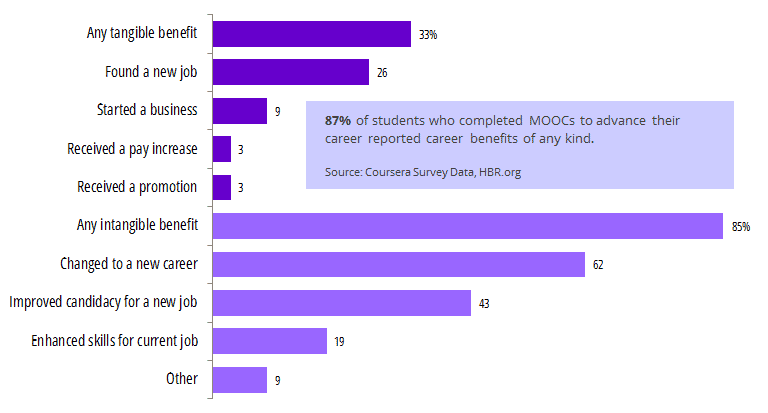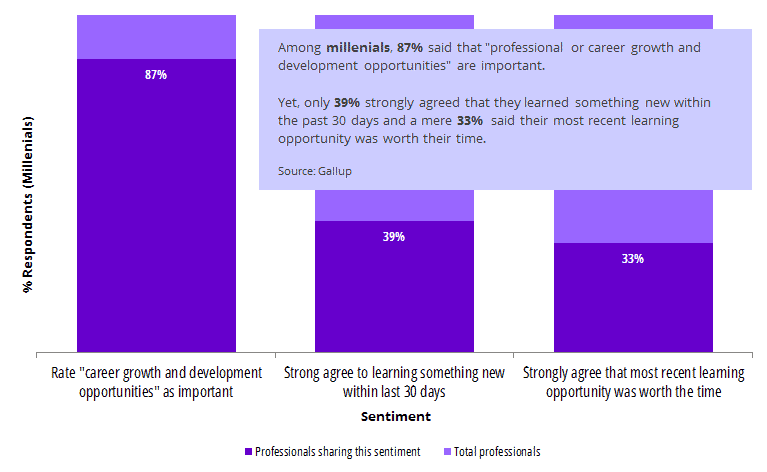
 In this series, we explore how professionals like you can use online courses.
In this series, we explore how professionals like you can use online courses.
Jump to a section:
- Getting Started (you're here)
- What kinds of online courses are professionals taking?
- Things you should know and helpful tips before you get started
- FAQs for Professionals
Your career growth is tied to learning.
In this guide, we’ll explain how online courses can help you advance your career.
Positive outcomes for career builders
Harvard Business Review recently surveyed individuals who use online courses to help build their careers. The results are eye-opening. Of these respondents, 87% reported benefits to their career, with 33% realizing tangible benefits like a raise or a new job. About 19% reported that courses helped them transition to a new career.
 These figures, if they tell us nothing else, indicate that there’s a strong likelihood that you’ll benefit your career by learning from online courses.
These figures, if they tell us nothing else, indicate that there’s a strong likelihood that you’ll benefit your career by learning from online courses.
Using online courses to learn effectively and efficiently
Like any class or training session you’ve taken before, online courses are designed to teach you valuable knowledge and skills.
At their core, they’re made up of pre-recorded lectures supplemented by readings, quizzes, assignments, and exams. Lectures in their entirety are usually run an hour to two hours long, but in their online format they’re typically broken down into 3-5 minute segments.
These segments make a world of difference. If you’ve ever put a book down with the intent of picking it up later, you’ve probably found that it’s easier to pause at the end of a chapter rather than in the middle of one. So it goes with segments. And since these segments are short, you could conceivably make progress by watching two or three segments each day during your breaks.
As you take these courses, you’ll find you learn as much between these segments as they do during. Instructors often add readings or links to supplementary material that enrich what you learn from prior segments. It’s also in between segments where you’ll find mini quizzes and short response questions designed to test your understanding of the materials just covered. These materials help reinforce your learning by forcing you to engage and interact with course more closely.
Learning from an online course is in many ways a guided experience.
Take what you need
One key difference between traditional training courses and online courses is that with the latter, you’re free to pick and choose topics you want to learn. There’s no penalty to skipping parts of a course (unless you’re pursuing a certificate). You determine what topics make the most impact on your career and invest your time and effort into learning them.
You should also know that online courses are highly flexible to your needs. If a course is moving too quickly, you can pause, repeat, and playback at slower speeds. Likewise, if it’s moving too slowly, adjust the playback speed to a faster setting. Again, you’re in full control.
Why online courses are more relevant than ever
Millennials now make up the largest generation in the US labor force and they’ve made their voices heard. The availability of learning opportunities in the workplace heavily influences their job satisfaction.
A recent Gallup survey reports that 87% of millennial workers valued “professional or career growth and development opportunities” as important. Despite this, only 39% strongly agreed that they had learned something in the past 30 days and only 33% said their most recent learning opportunity was worth their time.
 Millennials aren’t just demanding learning for learning’s sake, either. A real skills gap exists in the labor force. One report from LinkedIn Learning found that 92% of executives perceive a skills gap. Of those same executives, 90% said they thought learning and development (L&D) programs, which include training and coaching, can help narrow this gap.
Millennials aren’t just demanding learning for learning’s sake, either. A real skills gap exists in the labor force. One report from LinkedIn Learning found that 92% of executives perceive a skills gap. Of those same executives, 90% said they thought learning and development (L&D) programs, which include training and coaching, can help narrow this gap.
That sentiment’s translated into increased investment towards those L&D programs.
Yet, for all of the talk about investing in employees, it’s uncertain whether increased spending alone will make an impact. L&D spending per employee has risen steadily since 2011 according to Association for Talent Development, but most programs still fall short. Even the L&D professionals who oversee these programs have reservations—only 25% of them would recommend their programs to others.
A growing sense of urgency
If L&D continues its course at its current pace, it’ll likely be some time before we see significant changes to learning at the workplace. For the career-driven individual, time may be all but a luxury.
Skills have, on average, a shelf life of five years, according to LinkedIn Learning. Whatever cutting edge skills you’ve developed and put to use today may be less relevant in a few years. By neglecting or postponing your learning, you run the risk of falling behind your peers.
What’s next: figuring out which courses you’ll take
Aside from teaching a wide range of subjects—OpenCourser helps learners find over 7,500 courses across 150+ subjects—courses make learning effective, efficient, and highly flexible.
So far, we’ve discussed a few reasons why online courses make sense to professionals like you. In the next section, we’ll share some ideas about what kinds of courses you can take so you’ll know what’s available in our vast library of courses.



